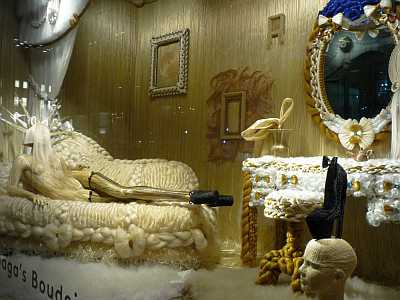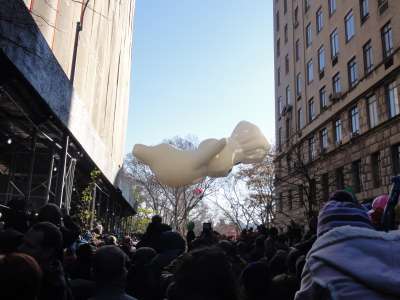Pages
▼
Pages
▼
Saturday, December 31, 2011
Friday, December 30, 2011
Movies | "Pina": Life as Dance
Dance as language or celebration of movement is not new and there are countless movies on dance. So I am wondering and trying to answer what made the movie “Pina” so special and memorable. Pina” is a 3d film/documentary of several performances of the late Pina Bausch “Tanztheater” The director Wim Wenders is one of the most profound storytellers of cinema and in his movies images tell stories as much as words. In “Pina” Wenders’ visual poetry makes compelling use of the 3d format. Not new, as 3d movies bring space to a 2d flat medium, the projection screen; often the architectural features of sets —thinking of the other remarkable feel good 3d movie “Hugo” are greatly enhanced by the 3d technology. But in “Pina” besides the set is the movement of the dancers’ bodies through space which becomes quite compelling experience for the viewers. From the simplest step to the most acrobatic jumps and falls the viewers feel surrounded by the energy of the larger than life dancer’s bodies, often emphasized by the lighting.
And of course Pina Bausch’ choreography makes the visual story captivating. Her work is defined a contemporary form of Tanztheater ("dance theatre"), the expressionist dance developed in Germany in the 1920s. The vocabulary is based on movement as expression, in contrast with ballet or other structured forms of dance, leading to a fusion between dramatic and rhythmic movement. The use of props is another important element of the performance: the dancers interact with chairs, sand, ropes, veils, water almost as extension of their body. Beauty often derived from the lyrical abstraction/presentation of otherwise ordinary objects or simple movements of daily life. In Pina dance is a component of daily life, as the set design goes beyond the stage to expand in a wider context of real places, either urban or landscape, offer the set. Dancers perform in the Schwebebahn (floating tram) of Wuppertal or in highways; any place can offer a pretest to express “joie de vivre” or any other feeling —quoting Matisse another visual artist who was intrigued by “la danse” as expression.
The story is also told through a few words from the dancers of Pina’s Wuppertal Tanztheater: besides their interaction with the charismatic choreographer, they reveal their life in a dance company as a greater community —perhaps utopian. The dancers span different generations making a statement that dance, at least in Pina’s world, is ageless.
And beauty and celebration of life can be found and expressed everywhere.
pina
dance dance otherwise we are lost
Wednesday, December 21, 2011
Events | Winter Solstice 2011
The December solstice —the winter solstice in the Norther Hemisphere— occurs at 05:30 UTC (Coordinated Universal Time) on December 22, 2011.
The winter solstice occurs when the Earth axial tilt of its polar hemisphere is farthest away from the Sun, at an angle 23° 26'.
Monday, December 19, 2011
Tuesday, December 13, 2011
Events | Getting Closer to the Higgs Boson "God Particle"
Today the two teams at CERN’s Large Hadron Collider (LHC) announced that they are very close to the finding of the Higgs Boson, described as the “God particle”, the quantum unit which will help to explain the origin of the Universe. They expects final findings in 2012.
For more information visit CERN
For more information visit CERN
Friday, December 9, 2011
Vernissages | NYC December 8, Chelsea
Clement Meadmore at Marloborough Gallery
Bosco Sodi "Ubi Sunt" at The PaceGallery
Peter Liversidge"Where We Begin" at Sean Kelly
Harry Roseman "Enfold" at Nancy Margolis
Thursday, December 8, 2011
Vernissages | December 1
"Night" curated by Antonio Petracca at Kim Foster Gallery
"Creomatic" at Eyebeam
Rebecca Sherman "Night Light" at one of the Chashama spaces
Thursday, November 24, 2011
events | Shopping Is the Opium of the People
Karl
Marx wrote in 1843 "Religion is the opium of the people" ("Die
Religion ... ist das Opium des Volkes"). This statement became paraphrased
in many forms including the popular “Sport is the opium of the people”. As the
holidays approach, a paraphrase Karl would not object to, is
“shopping is the opium of the people". The beginning of the holiday season,
is announced by the bombarding by countless ads in many form and format for
black Friday and cyber Monday; it also marked by the annual Macy's Thanksgiving Day Parade (started in 1924),
which I cannot escape living a few blocks away from the balloon inflation and
beginning of the parade.
Cheering crowds start flowing in the neighborhood from
the Wednesday afternoon; even this year, in spite of the economical crisis and
Occupy Wall Street protest few miles away, the shopping and its celebration
seems to be untouched in the hyperrealistic Macy’s parade, where inflated thirty-foot high balloons float (often face down) among the imponent Central Park West trees and buildings. The inflated balloons, are quite a metaphor for the current economy but hopefully will not burst in the crowds.
Wednesday, November 16, 2011
camminando | Madrid Barajas Airport
On my way back to NYC I had a pleasant layover at the Madrid airport. The Barajas Airport ranks as 11th busiest international airport in the world and 4th busiest in Europe and was recently (2006-2010) renovated. As a former airport terminal architectural designer for the NY JFK American Airlines terminal, I appreciated by the simple structural design of tree shaped steel columns supporting waveform trusses —waveforms and trees columns has been the main formal vocabulary for airport terminals worldwide. My criticism: the structure is unnecessarily, creating waste in energy consumption for heating and cooling, not to count materials and labor. But perhaps terminals are our time cathedrals, architecture connecting earth with sky, so scale is important. The color scheme consistency between paint structure and signage represent a good design and helpful for the passenger.
Excerpts from the multimedia project
“Axes Mundi: Perceptions and Understanding of Places as Intersections of Space, Time and Culture"
Monday, November 14, 2011
Sunday, November 13, 2011
camminando and vernissages | Roma, November 12
My evening walkabouts are filled with memories from the city where I was born and grew up, in places where thousand years of history intersect over two decades of personal history...a time-space contraction while I walk and walk. I often see a poster with Wim Wender's movie "Pina" with the subtitle "dance dance otherwise we are lost". It feels like a reminder to myself "walk, walk otherwise I am lost"
Vicolo delle Palline a Borgo Pio
Palazzo della Cancellera
Marcello Maugeri "Circus" at Ugo Ferranti
Piero Dorazio e gli artisti di Forma1 at Spazio 88
Tevere seen from Ponte Sisto
Arco di San Calisto
Santo Spirito in Sassia
San Pietro tells me "home sweet home"
My walk end at 10:30 pm, I am finally home, exhausted. My pedometer says that my daily walking amounted to 26 kilometers.
Excerpts from the multimedia project
“Axes Mundi: Perceptions and Understanding of Places as Intersections of Space, Time and Culture"



















































